Your B2B vs. B2C Content Marketing Guide
Nowadays, the discourse surrounding content has grown significantly. Companies of all kinds have joined the content production frenzy, recognizing its value and importance. Two distinct categories have emerged: B2B vs. B2C Content Marketing.
But why are these two categories necessary? Although these types of content overlap in some respects, there are still differences and different approaches. In this article, we’ll brief you on everything you need to know about the topic and how to harness it in your favor.
What is B2B Content Marketing?
B2B Content Marketing is a clever and strategic approach to marketing that involves crafting and sharing valuable, relevant, and consistent content to captivate and maintain a specific target audience, build relationships, establish trust, and drive growth.
In other words, it’s all about telling compelling stories, sharing industry insights, and providing helpful information to attract, connect and nurture your target audience in the business. It is a type of content made by businesses for businesses.
Thus, B2B Content Marketing centers around providing factual information and enlightening buyers on how your offerings can effectively save their business valuable time and money. Initially, B2B Content Marketing drew inspiration from its more glamorous counterpart, B2C. However, as it evolved, it cultivated its unique style and confidence.
But why do we keep hearing so much about it? Is it really that important? Well, we did the math, and B2B and B2C Content Marketing have taken off.
In a July 2022 survey by Statista, B2B marketers worldwide revealed their intentions for the upcoming 12 months. Half of the respondents expressed their plans to boost their B2B content marketing budget, with 14% aiming for growth of over 9%.
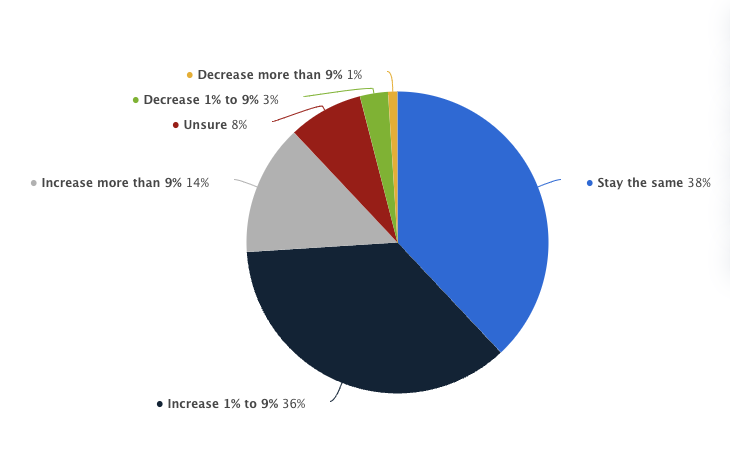
Source: Content Marketing Institute
Moreover, according to the Content Marketing Institute, 71% of B2B marketers reported that content marketing has witnessed increased significance within their organizations over the past year. So, it’s a piece of cake to realize that B2B Content Marketing will continue to grow.
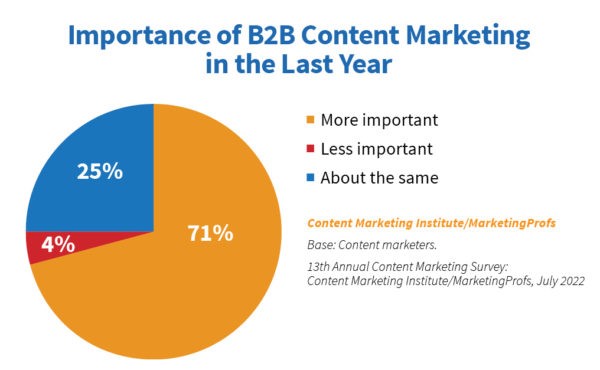
Source: Content Marketing Institute
What is B2C Content Marketing?
Let’s talk about the dinosaur now, B2C Content Marketing, because here we do not need to ask ourselves, “Who came first, the chicken or the egg?” because we know that B2C came first from the time when merchants (today’s businesses) produced goods for the population (customers).
B2C Content Marketing is a strategic marketing approach that involves creating exciting stories, helpful guides, and entertaining videos that capture the attention of everyday shoppers and make them fall in love with a brand’s products or services.
So, if you’ve ever watched a funny commercial, read a captivating blog post, or followed a brand on social media, you’ve experienced the magic of B2C Content Marketing, which is customer-focused.
For countless years, B2C reigned as the undisputed star, rightly capturing the majority of attention due to its immense demand. However, the tides of change are now apparent, with B2B steadily gaining prominence. Nonetheless, the significance of B2C must be considered.
Often, B2C Content Marketing adopts a more emotional approach, aiming to capture consumers’ impulses and emotions rather than relying solely on rational appeals. Thus, one significant benefit of B2C Content Marketing is directly engaging with consumers, eliminating intermediaries, and leading to a shorter sales cycle (more details will be discussed later).
Speaking about the importance of B2C Content Marketing, the challenge of formulating an effective content marketing strategy is undeniable, but its significance remains intact.
According to the Content Marketing Institute, 70% of B2C marketers have emphasized that content marketing has gained greater importance for their organization in the past year, with only 4% stating otherwise. So, we can see with the naked eye that B2C and B2B Content Marketing plays a crucial role nowadays.
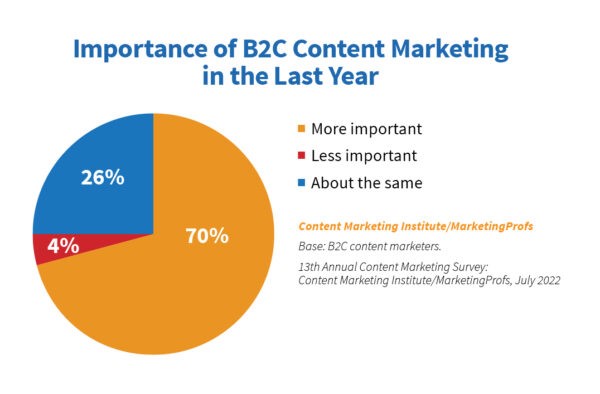
Source: Content Marketing Institute
B2B vs. B2C Content Marketing
Those who adhere to traditional marketing beliefs often portray B2B as an outlier, far removed from the glamorous realm of B2C.
In the past, marketers involved in creating B2B Marketing Content were occasionally perceived as individuals attempting to sell lackluster products or services to companies that might not even have a genuine requirement for them.
However, as mentioned above, B2B is steadily gaining prominence before B2C. The kind of B2B Content Marketing that was undesirable until recently surpasses B2C Content Marketing.
As an idea, Statista research on the B2B e-commerce market shows that in 2021, the B2B e-commerce market’s global value stood at a staggering $17.9 trillion, surpassing the B2C market by more than fivefold.
However, the distinction between B2C and B2B content marketing should no longer be the primary focus. Instead, the emphasis lies in differentiating content marketing strategies for long sales cycles versus short sales cycles, as the two domains are increasingly overlapping.
That’s why it’s essential to know the current differences (and the aspects that increasingly lend themselves to each other) between B2B Content Marketing and B2C Content Marketing.
However, to gain a deeper understanding of B2B Content Marketing and B2C Content Marketing, it is crucial to explore their key distinctions. Allow us to better explain.
1. Goals and Purposes
Above, we mentioned something related to short and long sales cycles, which are two important aspects of B2B and B2C Marketing goals and purposes. Now, it’s time to explain them more.
In general, B2C Content Marketing is designed for shorter sales cycles, meaning that its goal is to capture consumers’ attention and prompt them to make impulsive purchases that satisfy their immediate desires. In this case, the marketers’ purpose with their context is to emphasize the emotions this content conveys to customers to create a strong connection.
This ability is facilitated by shorter funnels accompanying shorter sales cycles. Products with shorter sales cycles usually have lower pricing, simplifying customers’ final purchasing decisions.
Look at this post from Lyft on what emotional engagement means to understand B2C Content Marketing better.
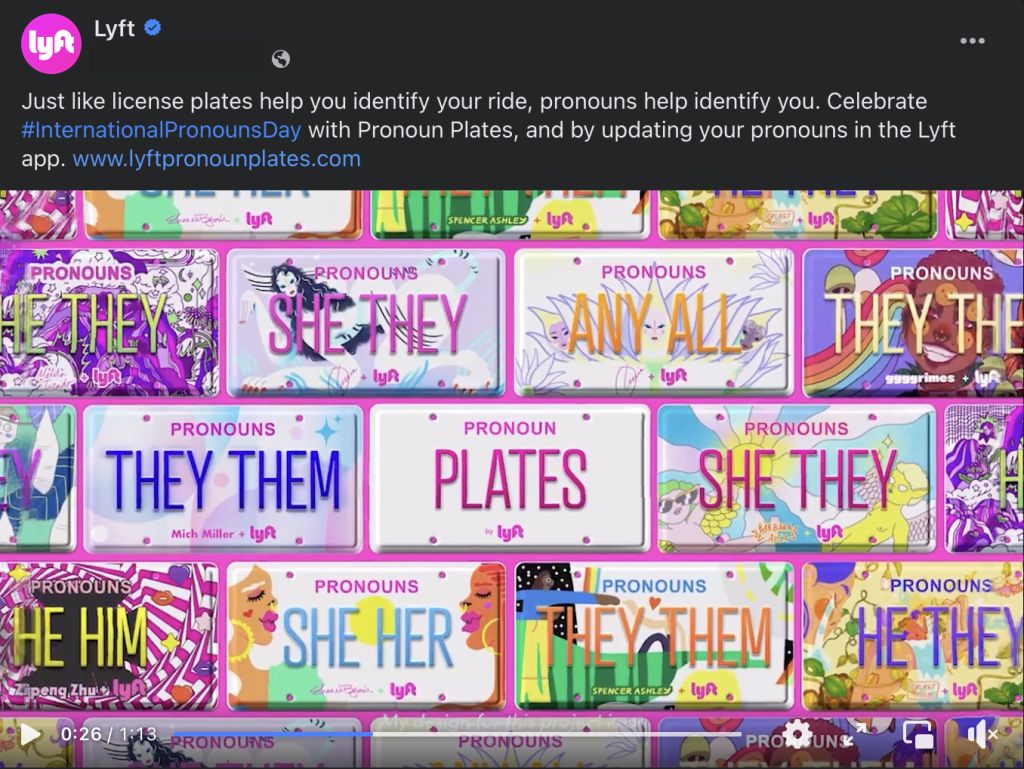
Source: Lyft (Facebook page)
Did that elicit a touch of emotion within you? Well, we felt it.
Also, B2C businesses often employ a broad marketing strategy to attract customers since their products or services are not tailored to a specific target audience or need a well-founded buyer persona. Consumers’ motivations for purchasing mass-market B2C products can vary widely.
In comparison, B2B Content Marketing caters to longer sales cycles. It builds trust and addresses the specific wants and challenges of targeted buyer personas.
B2C sales cycles are shorter, with more straightforward funnels and lower prices, while B2B sales cycles are longer and require nurturing relationships. Or retention, you can take it any way you want.
Look, Salesforce knows that.
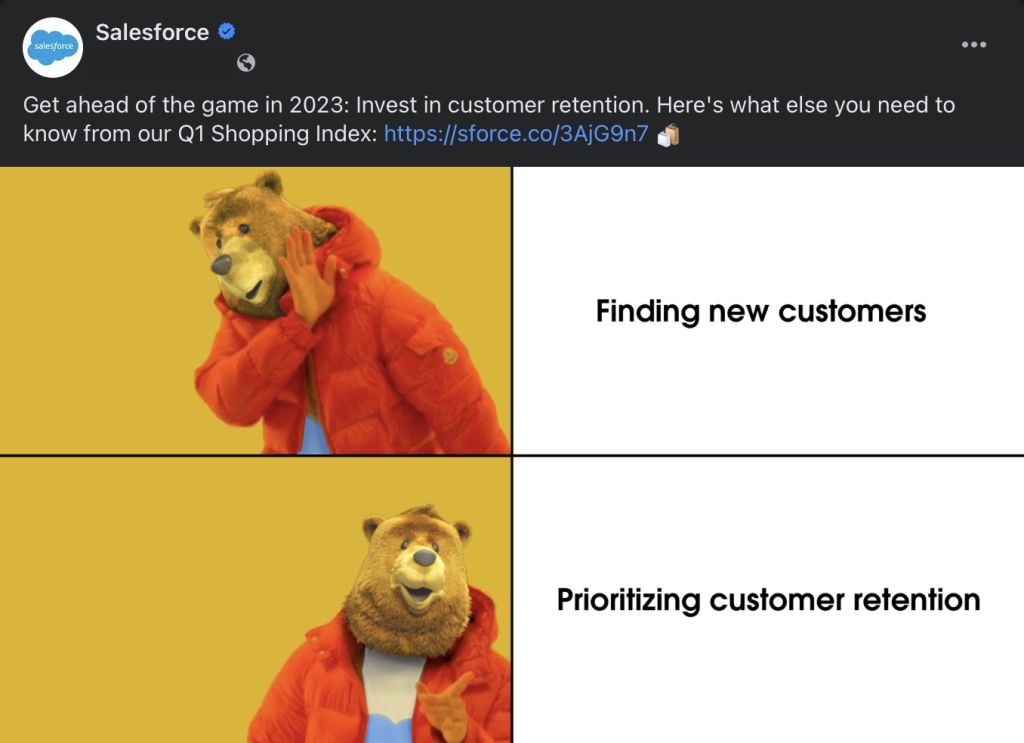
Source: Salesforce (Facebook page)
However, some businesses don’t neatly fit into these categories. Setting sales goals based on your unique sales cycle characteristics is more effective. Understanding your audience and creating tailored content will drive marketing success.
2. Content Strategy
B2B Content Marketing primarily focuses on various content metrics to boost ROI (Return on Investment), besides measuring data, and other tangible features. The goal is to provide factual information and insights about business processes.
The content seeks to appeal to the B2B audience by presenting complex data and accurate details demonstrating the product’s or service’s value and benefits. While storytelling can be compelling in B2B, it is most impactful when supported by data and evidence of ROI.
Direct your gaze to the captivating image below, where IBM’s post effortlessly maintains its primary objective of instilling trust.

Source: IBM (LinkedIn page)
On the other hand, B2C Content Marketing is designed to target individual consumers and evoke emotions. The content is crafted to elicit emotional responses and connect with the consumer. Strategic storytelling is crucial in engaging the B2C audience, driving their consumption, and making the content relatable.
The post below profoundly impacted us, fostering our sincere appreciation for TikTok’s genuine efforts to care for its users.
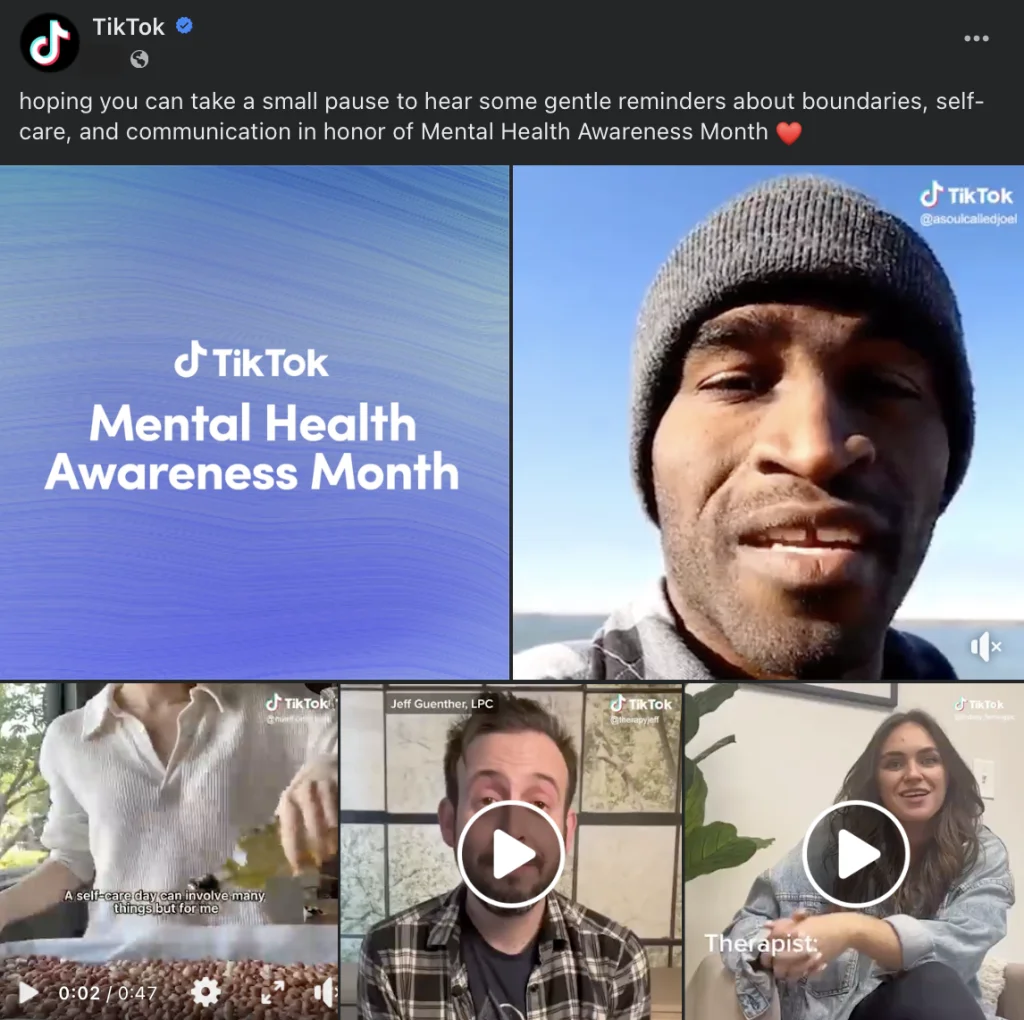
Source: TikTok (Facebook page)
Another important distinction between B2C and B2B Content Marketing lies in the relationship between the decision-maker and the end user.
In B2C scenarios, these roles typically merge into a single individual, whereas in B2B contexts, they are separate entities. Why? In B2C Content Marketing, the objective is to influence a single individual’s purchasing decision for a product or service.
Conversely, B2B Content Marketing seeks to persuade the decision maker that their acquisition will prove valuable for the end users within their business and serve as a wise strategic move.
Furthermore, disparities in content strategy become evident between B2B and B2C approaches. Given the extended sales cycle associated with B2B transactions, sales enablement assumes greater significance, whereas its relevance diminishes in shorter sales cycles.
Moreover, B2C content marketing frequently thrives in a community-oriented environment, owing to the affordability and tangibility of the products and services involved. This accessibility gives content creators a heightened sense of freedom to engage with their target audience.
So, the content strategy depends on these differentiating factors.
3. Decision-Making Process
B2C Content Marketing relies more on impulse buying, while B2B Content Marketing requires consideration of buyer emotions due to the higher stakes involved. B2B decisions involve more stakeholders and require relationship building, while individual customers typically make B2C decisions.
In B2B sales, particularly within the corporate environment, it’s crucial to acknowledge the intricate hierarchy involved. You engage with a specific individual who reports to a department, which answers to a department head, and the chain continues.
This complex process demands time, patience, and alignment from multiple stakeholders. In contrast, the B2C landscape operates differently, with a more straightforward decision-making structure.
In B2C, presenting an extensive report on the pros and cons of different smartphone brands will likely have a limited impact on the buyer’s decision-making process. Consumers often enter the market with preconceived preferences based on factors such as brand loyalty or personal recommendations.
Instead, engaging B2C content would focus on visually appealing social media posts showcasing each smartphone’s unique features and user experiences, captivating consumers’ attention and igniting their desire to own a particular device.
So, B2B Content Marketing has a lengthier decision-making process, while B2C is shorter.
4. Messaging
Every day, we encounter a multitude of B2C messages in various forms. It could be from your beloved local restaurant, a passionate fitness trainer, or even a visionary fashion designer. If you’ve been observant, you’ll notice that a prevailing stereotype surrounds B2C marketing: it is vibrant, lively, and overflowing with emotions.
Upon reflection, it becomes evident that this stereotype also permeates B2B marketing. You come across messages from Salesforce (predominantly a B2B-focused company) often characterized as dry, serious, and lackluster, right?
Well, generally, yes, but if we look again at the picture related to retention, we can see that this is not the case. After all, they used a meme that would appeal to younger generations and broke away from basic data-related posts.
So, however, in this perspective, we were seeing small changes.
A growing number of B2B enterprises are awakening to the fact that their target audience comprises real human beings, not mere automatons. Consequently, they are crafting messaging that resonates with the human touch, akin to what we commonly witness in B2C marketing.
Despite the typically conservative nature of B2B senior leadership, marketers are leading a transformative shift in the conversation. They have recognized that prospects and customers crave informative content and an element of entertainment within the professional realm.
This paradigm shift is poised to spur a significant surge in lighthearted messaging from B2B companies in the future.
5. Channels
Choosing channels is a crucial aspect that often distinguishes B2B and B2C content marketing.
B2C companies enjoy many potential avenues to reach their prospective customers. In a B2C campaign, you can often confidently appeal to channels such as:
- Facebook;
- Instagram;
- TikTok;
- Twitter;
- YouTube.
The list is seemingly endless, stretching far and wide. In addition to these usual social networks and popular websites, they can leverage traditional advertising mediums (TV Ads, Physical promos, Billboards), Google Ads (or other Ad Networks), other geo-targeting apps that deliver content and promotions based on proximity to physical stores, newsletters, and more.
In contrast, B2B businesses may face a narrower range of engagement opportunities. B2Bs must exercise careful selectivity and truly understand the whereabouts of their target audience. Some popular channels often leveraged include:
- LinkedIn;
- Email Marketing;
- Blog content;
- Webinars;
- Whitepapers;
- Reports;
- Google Search, and others.
While publishing native advertising may capture the attention of individual consumers, it is less likely to resonate with larger groups of potential business buyers.
The distinction in channels between B2C and B2B content marketing stems from the differing relevance of their products in professional and personal contexts. B2C products often occupy the forefront of individuals’ minds during work and leisure hours. In contrast, B2B products primarily pique interest during the workday.
B2B Content Marketing Examples
Caterpillar Machines Play Jenga – #BuiltForIt Campaign
Stack | Cat® Trials
As mentioned earlier, B2B companies have often been associated with producing dull campaigns. However, it is worth noting that even traditionally “boring” companies are stepping out of their comfort zones to create captivating content. Salesforce serves as a prime example of this transformation.
But Salesforce is not the only company challenging the status quo. A shining illustration of an exemplary B2B Content Marketing campaign can be seen in Caterpillar’s remarkable efforts. Their campaign encapsulates what a successful B2B content strategy should strive to achieve.
Typical content elements of a B2B company appear (that machine-related data), the purpose is fulfilled, it contains essential information for decision-making, and it appears on the proper channels—all this adds up to a good campaign.
HubSpot and Their Free Marketing Resources
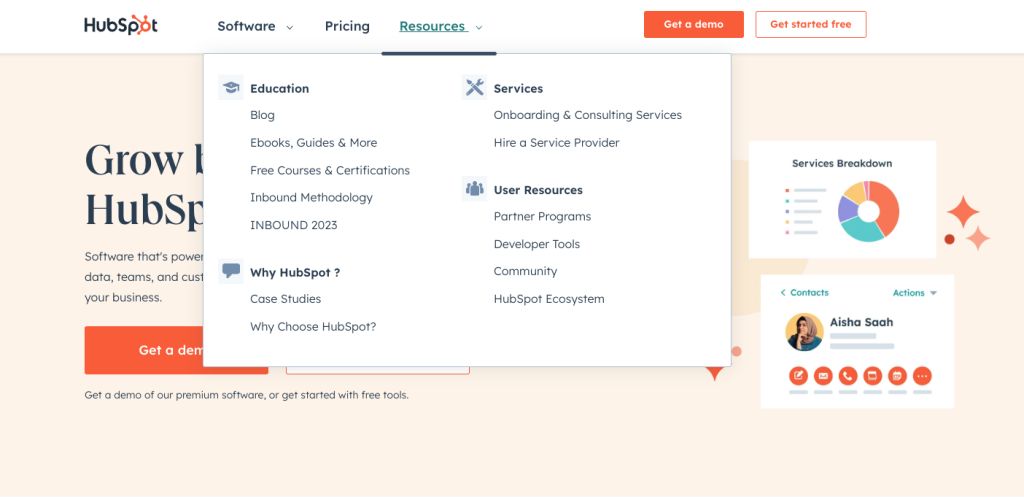
Source: HubSpot.com
We cannot overlook blog content’s power when discussing impactful examples.
HubSpot is widely recognized as a comprehensive inbound marketing, sales, and service software provider for enterprise-level businesses. However, its prominence extends beyond marketers due to its extensive collection of precious and mostly free marketing resources.
These resources encompass various formats, including blog posts, case studies, e-books, guides, courses, and certifications. Each category contains numerous resources packed with data-driven insights to help businesses manage and grow effectively.
By offering these resources, HubSpot successfully drives organic traffic to its platform, ultimately converting leads into paying customers without substantial advertising expenses.
Based on this approach, HubSpot is often a benchmark for what quality content means to people in marketing, sales, and beyond.
Deloitte’s Business Chemistry
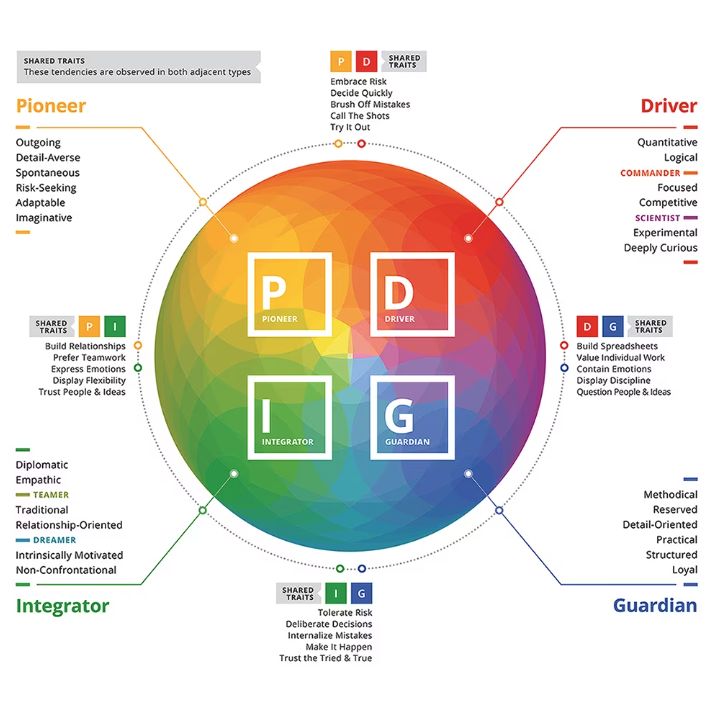
Source: Deloitte.com
What professional doesn’t appreciate comprehensive reports with relevant data and in-depth research on specific topics? Surely, those in decision-making positions appreciate them. And that’s not all Deloitte offers.
Business Chemistry by Deloitte is a sophisticated assessment that evaluates leadership styles and offers resources for skill development. Moreover, Deloitte’s content strategy has demonstrated impressive results. Their website attracts millions of monthly visits.
By branching out from a single quiz, Deloitte has created a diverse range of content opportunities, reinforced the value of the initial quiz, and further engaged its audience.
B2C Content Marketing Examples
PopCorners Break into Something Good Campaign
PopCorners made a memorable impression at the 2023 Super Bowl, capturing the attention of general viewers and avid Breaking Bad fans. Their strategic approach paid off, as their commercial featuring the beloved cast of Breaking Bad garnered widespread acclaim.
The quality of PopCorners’ Super Bowl commercial speaks for itself. Not only did we consider it exceptional, but industry professionals also hailed it as one of the best at this year’s Super Bowl.
After a decade of anticipation, the cast of Breaking Bad returned triumphantly to our screens, teaming up with PopCorners for their debut Super Bowl commercial. This collaboration was a highly anticipated event that generated immense excitement among fans and showcased the brand’s commitment to delivering an extraordinary advertising experience.
Spotify Wrapped

Source: Spotify.com
If you were active on Instagram towards the end of the year, chances are you came across screenshots of Spotify Wrapped on someone’s Instagram Story. It seemed like everyone was sharing their personalized year-end playlist.
Introduced initially as Spotify’s Year in Music in 2015, the feature curated a playlist of each user’s top 100 songs for the year. It underwent a name change in 2016, becoming Spotify Wrapped. In 2017, it evolved to provide more customized insights and introduced the ability to share personalized stats on social media platforms.
We are active on social media. I don’t know about you, but we don’t have an end-of-year when we don’t see dozens, if not hundreds, of Spotify Wrapped-related stories.
Flip.eu’s Smart is Better Campaign
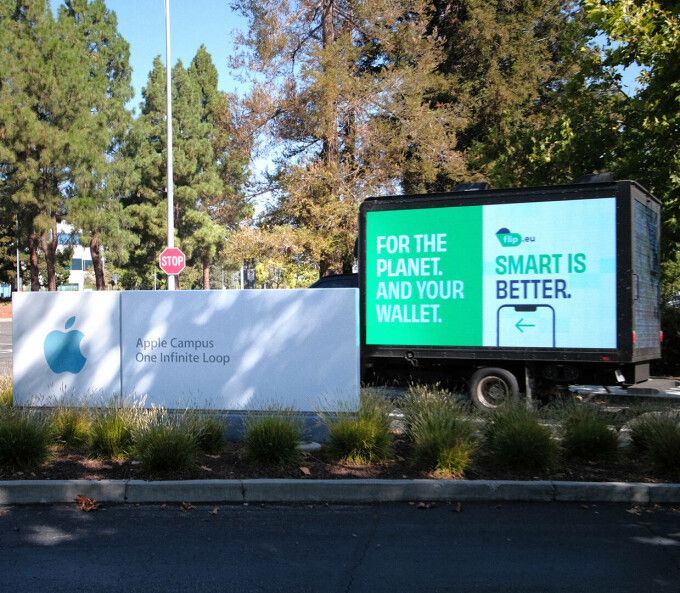
Source: Flip (Facebook page)
The highly anticipated iPhone 14 launch was accompanied by an intriguing campaign orchestrated by Romanian start-up Flip.eu, a company specializing in refurbishing and reselling used phones.
During this momentous occasion, Flip.eu took a bold step by sending a powerful message right in front of the prestigious headquarters of the American tech giant in Cupertino, California. The brand rented a truck adorned with a captivating LED screen TV, which circulated near the Apple Campus. The vibrant display showcased congratulatory messages for the new iPhone.
The messages displayed on the LED screen were thoughtfully crafted to captivate the audience and promote the importance of sustainability and consumer choice. Phrases such as “We’re already celebrating the relaunch,” “This is not just a launch, but a relaunch for re-used phones,” and “The model is just a number” aimed to inspire customers to embrace a more sustainable approach by purchasing refurbished phones in excellent condition, among the countless options already available.
Through this innovative campaign, Flip.eu successfully captured attention (at least in Europe, where it currently operates), emphasizing its commitment to providing high-quality refurbished phones while encouraging customers to make environmentally conscious choices.
Final Take
The once distinct boundaries between B2B vs. B2C Content Marketing are rapidly diminishing. B2B companies strive to humanize their products and deliver engaging consumer experiences. However, due to the inherent freedom and flexibility enjoyed by B2C enterprises, they often maintain a competitive edge.
Interestingly, the exchange of ideas and strategies between the two sectors continues unabated. Those operating in the B2B2C space are particularly well-positioned to leverage these synergies, adapting their approaches based on their specific context.
Looking ahead, the lines separating B2C and B2B content marketing will inevitably blur even further. The traditional notion of “cool” B2C versus “boring” B2B will become a faded remnant of the past as both domains embrace innovative and captivating strategies to engage their audiences. This evolution promises a future where the boundaries between B2C and B2B are indistinguishable, giving rise to a dynamic and unified content marketing landscape.